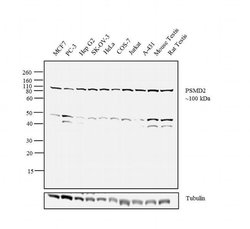Learn More
PSMD2 Polyclonal Antibody, Invitrogen™
Rabbit Polyclonal Antibody
Brand: Invitrogen PA1962
Description
PA1-962 detects proteasome 19S subunit 10B from canine, hamster, human, mouse and rat tissues and cells. PA1-962 has been successfully used in Western blot procedures. By Western blot, this antibody detects ∽42, 46, 48, and 52 kDa proteins which correspond to subunit 10B and probably the combined signal from 4, 6B, 7, and 8 subunit proteins. PA1-962 immunizing peptide corresponds to amino acid residues 278-294 of human proteasome 19S subunit 10B. This sequence is conserved in 19S protein subunits S4 (∽53 kDa), S6A (∽53 kDa), S6B (∽46 kDa), S7 (∽47 kDa), and S8 (∽45 kDa). PA1-962 immunizing peptide (Cat. No. PEP-107) is available for use in neutralization and control experiments.
Proteolytic degradation is critical to the maintece of appropriate levels of short-lived and regulatory proteins as important and diverse as those involved in cellular metabolism, heat shock and stress response, antigen presentation, modulation of cell surface receptors and ion channels, cell cycle regulation, transcription, and signalling factors. The ubiquitin-proteasome pathway deconstructs most proteins in the eukaryotic cell cytosol and nucleus. Others are degraded via the vacuolar pathway which includes endosomes, lysosomes, and the endoplasmic reticulum. The 26S proteasome is an ATP-dependent, multisubunit (∽31), barrel-shaped molecular machine with an apparent molecular weight of ∽2.5 MDa. It consists of a 20S proteolytic core complex which is crowned at one or both ends by 19S regulatory subunit complexes. The 19S regulatory subunits recognize ubiquitinated proteins and play an essential role in unfolding and translocating targets into the lumen of the 20S subunit. An enzymatic cascade is responsible for the attachment of multiple ubiquitin molecules to lysine residues of proteins targeted for degradation. Several genetic diseases are associated with defects in the ubiquitin-proteasome pathway. Some examples of affected proteins include those linked to cystic fibrosis, Angelman’s syndrome, and Liddle syndrome.
Specifications
| PSMD2 | |
| Polyclonal | |
| PSMD2 | |
| F23F1.8 | |
| Rabbit | |
| Ammonium sulfate precipitation | |
| RUO | |
| 100750425, 21762, 287984, 478654, 5708 | |
| -20° C, Avoid Freeze/Thaw Cycles | |
| Liquid |
| Immunocytochemistry, Immunofluorescence, Western Blot | |
| Unconjugated | |
| Q13200, Q8VDM4, Q4FZT9 | |
| PSMD2 | |
| Synthetic Peptide: C A(278) T N R P D T L D P A L L R P G R(294) | |
| 100 μL | |
| Primary | |
| Canine, Hamster, Human, Mouse, Non-human Primate, Rat | |
| Antibody | |
| IgG |
Your input is important to us. Please complete this form to provide feedback related to the content on this product.


